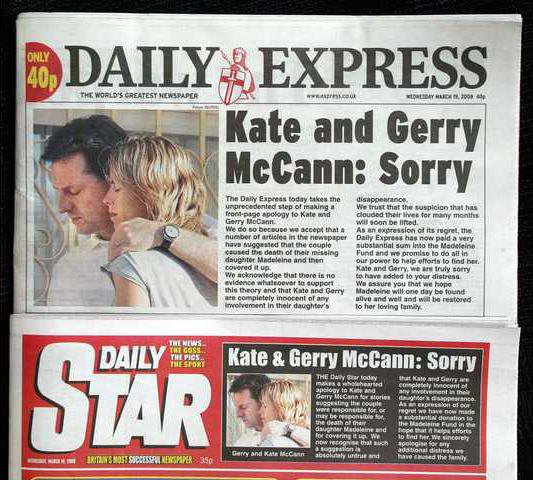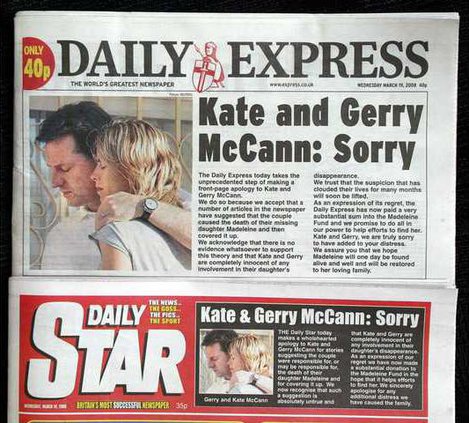LONDON — For British tabloid editors, sorry always seems to be the hardest word.
Readers and journalists got a shock Wednesday when they saw the headlines in the Daily Express and the Daily Star: ‘‘Kate and Gerry McCann: Sorry.’’
Both newspapers ran rare Page 1 apologies to the parents of missing child Madeleine McCann, acknowledging there was no evidence to support claims they caused their daughter’s death.
The words — and the papers’ million-dollar libel payout to the McCanns — sent a chill through the British media. But some media-watchers doubted the case would rein in Britain’s fiercely competitive tabloids, which regularly blur the lines among rumor, innuendo and fact.
In their apologies, the newspapers said, ‘‘Kate and Gerry are completely innocent of any involvement in their daughter’s disappearance.’’
‘‘Express Newspapers regrets publishing these extremely serious, yet baseless, allegations,’’ said the papers’ lawyer, Stephen Bacon.
The McCanns said the newspapers had been called to account for ‘‘grotesque and grossly defamatory allegations.’’
Madeleine’s story has fascinated Britain since she vanished May 3 — a few days before her 4th birthday — during a family vacation in Portugal. No trace of her has been found.
Four months after Madeleine disappeared, Portuguese police named her parents as ‘‘arguidos,’’ or formal suspects — although they have not been charged and were allowed to leave the country. The couple insist they were not involved in their daughter’s disappearance, and mounted a campaign to find her.
The McCanns have complained that Portuguese laws prevent them from discussing the case and defending themselves against rumors. In the meantime, British media have published sensational stories claiming to be based on leaks, apparently from Portuguese officials.
The Express and Star led the pack, running front page stories for months, many attributed to anonymous sources.
One day the McCanns were depicted as victims — in headlines like ‘‘Madeleine: Her Mother is Innocent’’ — the next as suspects. Stories asked whether the child’s blood had been found in the couple’s rental car and whether her body had been dumped in the sea.
The McCanns filed a lawsuit complaining that more than 100 articles in the two papers were defamatory. The newspapers — both owned by the Express Group — settled out of court, agreeing to apologize and pay $1.1 million in damages. The McCanns said the money would go into a fund they set up to help find their daughter.
British newspapers are no strangers to the libel courts, and tabloids regularly pay thousands of pounds to settle lawsuits filed by celebrities.
A front-page apology, however, is almost unknown. Experts said the last one they could remember was The Sun’s apology to Elton John in 1988 for stories about his personal life.
Adrian Monck, head of the journalism program at London’s City University, said the McCann case would make editors more careful about printing rumors and speculation. He said that with the McCann story, ‘‘editors took a calculated bet that they could push the envelope in terms of the sort of information they could get away with.’’
‘‘This is a reminder that the rules apply and you can’t just circulate half-truths and rumors,’’ Monck said.
But public relations guru Max Clifford was not so sure anything would change.
‘‘Sensational stories sell. Sensational headlines sell,’’ he said. ‘‘That’s a fact of life.’’
Readers and journalists got a shock Wednesday when they saw the headlines in the Daily Express and the Daily Star: ‘‘Kate and Gerry McCann: Sorry.’’
Both newspapers ran rare Page 1 apologies to the parents of missing child Madeleine McCann, acknowledging there was no evidence to support claims they caused their daughter’s death.
The words — and the papers’ million-dollar libel payout to the McCanns — sent a chill through the British media. But some media-watchers doubted the case would rein in Britain’s fiercely competitive tabloids, which regularly blur the lines among rumor, innuendo and fact.
In their apologies, the newspapers said, ‘‘Kate and Gerry are completely innocent of any involvement in their daughter’s disappearance.’’
‘‘Express Newspapers regrets publishing these extremely serious, yet baseless, allegations,’’ said the papers’ lawyer, Stephen Bacon.
The McCanns said the newspapers had been called to account for ‘‘grotesque and grossly defamatory allegations.’’
Madeleine’s story has fascinated Britain since she vanished May 3 — a few days before her 4th birthday — during a family vacation in Portugal. No trace of her has been found.
Four months after Madeleine disappeared, Portuguese police named her parents as ‘‘arguidos,’’ or formal suspects — although they have not been charged and were allowed to leave the country. The couple insist they were not involved in their daughter’s disappearance, and mounted a campaign to find her.
The McCanns have complained that Portuguese laws prevent them from discussing the case and defending themselves against rumors. In the meantime, British media have published sensational stories claiming to be based on leaks, apparently from Portuguese officials.
The Express and Star led the pack, running front page stories for months, many attributed to anonymous sources.
One day the McCanns were depicted as victims — in headlines like ‘‘Madeleine: Her Mother is Innocent’’ — the next as suspects. Stories asked whether the child’s blood had been found in the couple’s rental car and whether her body had been dumped in the sea.
The McCanns filed a lawsuit complaining that more than 100 articles in the two papers were defamatory. The newspapers — both owned by the Express Group — settled out of court, agreeing to apologize and pay $1.1 million in damages. The McCanns said the money would go into a fund they set up to help find their daughter.
British newspapers are no strangers to the libel courts, and tabloids regularly pay thousands of pounds to settle lawsuits filed by celebrities.
A front-page apology, however, is almost unknown. Experts said the last one they could remember was The Sun’s apology to Elton John in 1988 for stories about his personal life.
Adrian Monck, head of the journalism program at London’s City University, said the McCann case would make editors more careful about printing rumors and speculation. He said that with the McCann story, ‘‘editors took a calculated bet that they could push the envelope in terms of the sort of information they could get away with.’’
‘‘This is a reminder that the rules apply and you can’t just circulate half-truths and rumors,’’ Monck said.
But public relations guru Max Clifford was not so sure anything would change.
‘‘Sensational stories sell. Sensational headlines sell,’’ he said. ‘‘That’s a fact of life.’’

